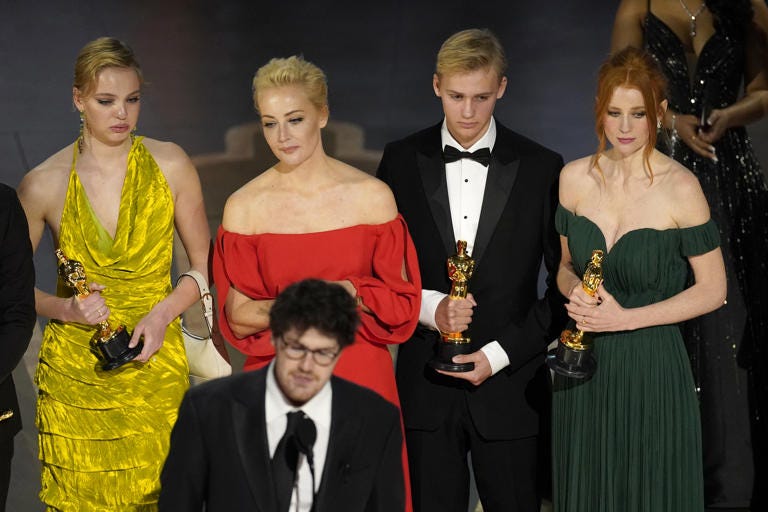Navalny's Oscar Triumph Offers a Solid Lesson
Speaking of the "apolitical" award ceremony and "the moral hero"'s career goals
It happened.
Despite extensive and justified criticism, a film about Alexey Navalny, named simply “Navalny”, won the The Academy Award for Best Documentary.
Focusing on Navalny’s personality and opposition to Putin, as well as the Kremlin’s attempt to poison him with “Novichok” in 2020, it depicts Alexey as a sort of a moral hero who has been fighting against the KGB agent’s corrupt and evil regime.
To a great extent, it is true. Navalny has indeed been opposing Putin for over a decade.
During the largest anti-regime protests in Putin’s Russia — the Bolotnaya protests (2011-2013), — he was often spotted next to Boris Nemtsov, murdered in 2015 by Putin and his gang.
In 2021, after he recovered from the Kremlin’s failed attempt to kill him, he made a video about an enormous palace belonging to Putin, which reportedly has a shisha parlor as well as the dictator’s absolutely must: the golden loo.
Yanukovych had one.
Putin has one.
Lukashenko’s is yet to be discovered.

I understand why for some Russians Navalny is a prominent figure: he is well-spoken, good-looking, does have an anti-corruption agenda, and is overall appealing to the hip and progressive Russians living in big cities like Moscow or Saint Petersburg.
I even understand why some Westerners like him — basically for the same reasons and their rather idealistic beliefs in the prevailing goodness of humankind.
What I don’t understand is how come this appeal eclipses other, far less enticing yet very important aspects about Navalny’s personality that have been brought to light again and again by a variety of prominent voices?
Over the years, Navalny made sure to demonstrate in every way possible that he not only has no problem with the Russian expansionist foreign policy approach, but even kind of hinted at the fact that Putin is doing rather poorly in this respect.
Most of these inglorious episodes have been brought up in this excellent thread by Ostap Yarysh, journalist and anchor at the Ukrainian service of Voice of America News.
He points out, among other things, that in 2008, Navalny supported Russia’s invasion of Georgia and wrote in his blog that he’d “really like to hit Georgian General Staff with a cruise missile” — a statement he stood by in 2017.


Crimea, which he once compared to a sandwich that can’t be passed around back and forth, has been marked as part of Russia on his website.
He also had the nerve to say that Ukraine, Belarus, and Russia are "one people" who need to cooperate closely, with Moscow dominating this alliance.
Naturally.
As if we needed a reminder.
Some may say that Navalny’s position underwent profound change after Feb.24 and his imprisonment.
He authored an essay for the Washington Post where he said that “Ukraine must remain an independent democratic state capable of defending itself".
Recently, he also stated in a new manifesto that Russia must recognize the 1991 international borders of Ukraine.
Yet, even now, one year into the war, he could not help but add that “almost all borders worldwide are accidental and thus always make someone angry”.
This may sound like a somewhat true and innocent statement — but it really is not when you analyze the context and his track-record. Rather, it feels like he is once again sending a message that yeah, the “sandwich is still ours.”
Add the “the accidental border line” statement’s dubious veracity and you may as well end up doubting this notion “of profound change”.
To a much greater extent, his sudden change of heart and “pro-Ukrainenness” smacks of an attempt to capitalize on the political vacuum in Russia.
Navalny doesn’t have a solid competitor and wants to be liked. And he can only do so if he starts sending the right messages to the western public and governments which are not very allured by the idea of Russia’s collapse.
It’s simply a career move, — and has little to do with his true beliefs or desire to help Ukraine.
His wife and children’s decision not to talk about Russia’s war in Ukraine at all in their speech — or at least give a word of praise to their competitor the “House Made of Splinters” documentary set in war-torn Luhansk Oblast — only reiterates this impression.
Is it because the Oscars is purportedly non-political?
Well, the adviser to President Zelenskyy — whose address to the Oscars 2023 was rejected by the organizers for the second time in a row — Mykhailo Podoliak rightly underscores in his tweet that this is a hypocritical approach as “Navalny” is as political as it gets.

Similar points were raised by Ukrainian journalist Veronika Melkozerova in her article “And the Oscar for being snubbed goes to … Ukraine” for Politico Europe, rightly underscoring that Navalny’s family was there for themselves, looking glamorous to the bone.
And promoting Navalny’s name.
So, which solid lesson does Navalny’s Oscar triumph teach us?
None really other than that your values can be dubious in many respects — and yet it doesn’t preclude you from earning the “moral hero” badge.




